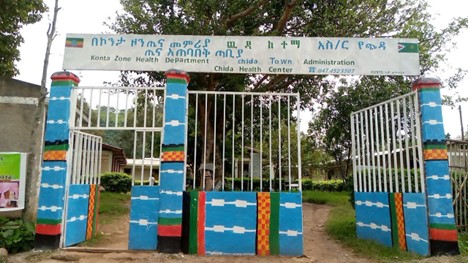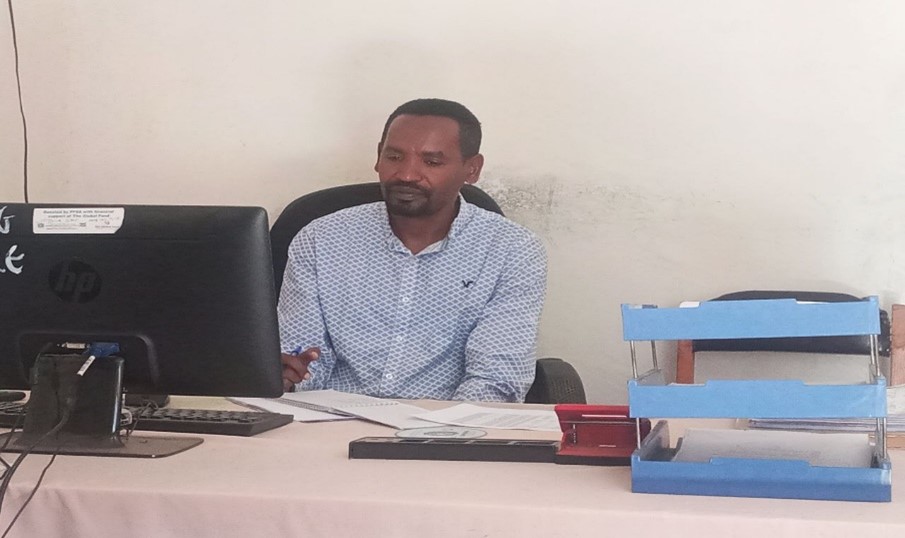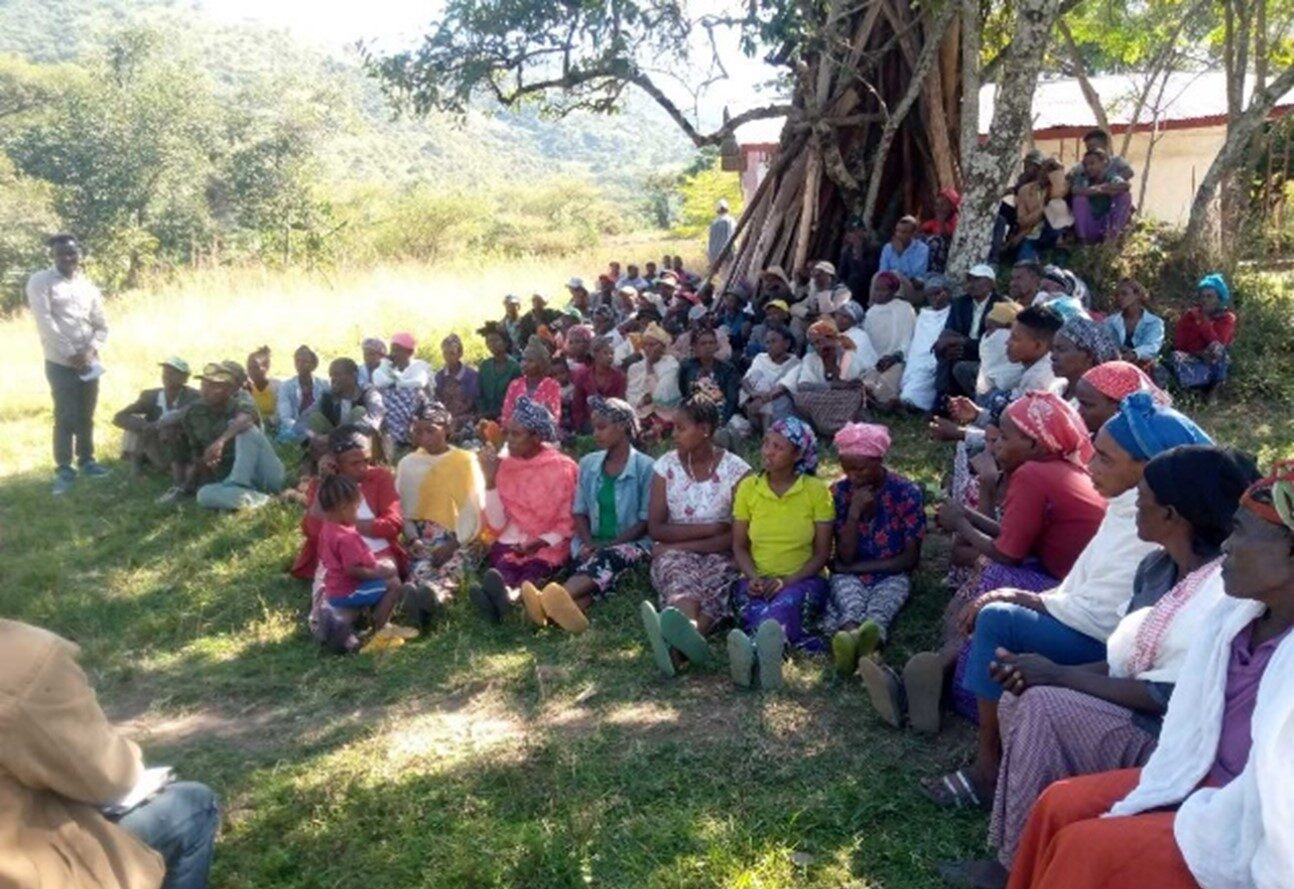Success Story
The Case of Chida Health Center: Community Score Card Implementation in Southwest Ethiopia
February 16, 2023
NPI EXPAND Ethiopia and IWCIDA Partnership
The USAID Ethiopia Mission is engaging NPI EXPAND to support their Empowered Communities for Better Health (ECBH) project, which aims to empower communities to take action and ownership over their health and nutrition and drive a cycle of responsive and accountable service delivery. Moving away from a supply/demand model of health systems development, the ECBH emphasizes the need to engage communities toward improved health services and outcomes.
In FY23, NPI EXPAND Ethiopia selected six organizations to receive grants to implement social accountability interventions in four regions: Amhara, Sidama; Southern Nations, Nationalities, and Peoples’ Region; and Southwest Ethiopia Peoples’ Region. Grantees began implementation in late 2022 and are working to facilitate social accountability efforts toward improved community engagement in the health sector with the ultimate aim of increasing uptake of high-quality, high-impact family planning (FP) and maternal, newborn, and child health (MNCH) services.
Ilu Women and Children Integrated Development Association (IWCIDA) is a local organization in Ethiopia dedicated to assisting women and children in improving their social, health, education, and economic well-being. A critical piece of this work is ensuring women and children play an active role in their communities and in projects that impact their livelihoods. This NPI EXPAND grantee is implementing social accountability activities in Primary Health Care in Southwest Ethiopia region in the four Woredas, including El Hancahno, Ameya Zuria, Tercha Zuria, and Zaba Gazo woredas. Chida Health Center is one of the public health facilities supported by IWCIDA under the NPI EXPAND Ethiopia activity.
Chida Health Center and the Community Scorecard Approach

Chida Health Center in Southwest Ethiopia
Chida Health Center was established in 1978 EC in Ethiopia’s southwest region, Konta zone, El hanchano woreda. The health center is located in Chida town, 20 kilometers away from Amaya (capital town of Konta zone). With its ten satellite health posts, Chida Health Center provides health services to a total of 31,943 people residing in 14 kebeles (local districts). Chida Health Center has 39 staff with diverse professional qualifications, including: 2 nurses, 4 midwives, 5 Health Officers, 3 pharmacists, 2 general practitioners, 4 lab technicians, 2 health information technicians, and17 supportive staff.
NPI EXPAND Ethiopia local partners are working with health centers such as Chida Health Center to ensure communities are more actively involved in social accountability processes, ultimately striving toward a more responsive and higher quality health service system. The community score card (CSC) approach is how local partners are working within the health system to improve these services.
The community score card cycle involves six main steps as outlined by the ALMA Scorecard Hub:

The scorecard uses six evaluation criteria to assess the perception of service quality from community members:
- Caring, respectful and compassionate (CRC) service
- Waiting time for health care services
- Availability of drugs, diagnostics, and supplies
- Infrastructure of facility (electricity, water, rooms)
- Availability and management of ambulance
- Clean and safe health facility
CSC Implementation at Chida Health Center Before NPI EXPAND
Chida Health Center’s Director, Mr. Kebede stated that prior to the launch of NPI EXPAND, the health center had been reporting CSC results for the sake of reporting. He indicated that the health center has been doing this simply for the purpose of satisfying the top managers’ requests.

Kebede Berhanu – Chida Health Center Director Jan 2023
Every quarter, the health center team went to some kebeles served by the health center and had the community evaluate the health center performance on the six predetermined indicators mentioned above for CSCs, which is completely out of the standard scoring process. The community was also not encouraged to score the health center performance on health service delivery objectively. As a result, the service delivery performance of this health center consistently rated its performance at 95% satisfaction, though the community satisfaction on services was much lower.
It was clear that the health center staff didn’t understand the essence of CSC scoring process. They were just implementing community scorecard only to comply with the reporting requirement rather than implementing it in line with national guidelines. For example, the scoring process was done through simple hand raising or home-to-home visits with no community interface meetings after scoring sessions rather than through a collaborative community-based process.
Before NPI EXAPND and IWCIDA’s support in this region, social accountability practices were there in name but absent practically. It was clear that in order to strengthen social accountability efforts in the region, work had to be done to improve the CSC implementation, establish and strengthen client councils, and work more closely with the community to improve health services at the center.
NPI EXPAND and IWCIDA Support of CSC Implementation
In response to the many challenges noted by Mr. Kebede within the health center’s approach to CSC, IWCIDA, through its grant from NPI EXPAND, organized to address these concerns. IWCIDA organized a three-day training for the health center’s staff on social accountability and the CSC implementation approach. The training highlighted the importance of the CSC and how to implement it in a way to get accurate data representative of the center’s catchment area. HEWs were also trained on this topic, a critical group to understand this information as they work at the grassroots level. Using this information, client council members were established at each health post, demonstrating improvements in the CSC approach with support from the project.
Mr. Kebede noted that “NPI EXPAND project came with many blessings, including sharing knowledge and experience and providing us with materials that are very essential to implement SA/CSC in our region as well”. He stated that “Upon the introduction of NPI EXPAND project in our region, the project has organized three-day training for staff of health centers, including myself, on SA/CSC implementation. The training was very fruitful where we have learned a lot on the importance and how to implement CSC in our health centers catchment areas. The same training was also given to the HEWs who are working at the grassroots level”. Mr. Kebede added that, “following the knowledge and experience we have grasped from the training given to us [Chida Health Centers staff], the team began to offer a full support to realize the implementation of project activities including the establishment of client council members at each health posts”.
Promising Improvements at the Health Center with the Support of NPI EXPAND

Community Interface meeting January 2, 2023
As a result of these interventions, the next CSC scoring brought back an average community satisfaction rate of 52%, believed to be an accurate representation of the community’s perception of the center’s quality, compared to the original score of over 90%. Despite the average satisfaction score of the community decreasing, it is an indication that the scorecard process was implemented in a more accurate way to capture the needs and experience of the community and thus can better inform improvements to the health center that otherwise may not have been addressed. The Director noted that when communities are free to evaluate his organization’s service delivery, they fall far below societal expectation. He noted, “In light of the lessons we learned from NPI EXPAND project activities, we have already cascaded the good lessons to other health posts that are not included in your project implementation areas”.
One such lesson learned is the utility of conducting monthly review meetings with HEWs operating at the health posts. These are now being held with HEWs regularly to ensure quality service delivery. Additionally, the health center is establishing client council at kebeles in the area.
Looking Forward
With the impactful support of IWCIDA and NPI EXPAND, the Chida Health Center has shown noted improvements in a short period of time in their social accountability efforts at the community levels. The establishment of client councils to assist with the independent scoring process of CSCs is just one example. The health center’s director underscores the critical nature of these improvements, noting that health center workers had not been trained in the area of CSC scoring prior to IWCIDA’s workshop. However, following the training and orientation given to the health center staff, they began to cascade the same to the kebeles which are not included in the project’s implementation areas. The impact of the project’s support, thus, will go even beyond the intervention area.
Today, NPI EXPAND and IWCIDA continue to support the Primary Health Care System towards the improvement of family planning and maternal, newborn, and child health services in woredas. The project will provide ongoing mentoring and coaching support to health workers and monitor the implementation of joint action plans prioritized during the interface meetings. The project will also provide capacity strengthening support to the health care team to sustain high-quality CSC implementation quarterly.